Alberta
79 new cases of COVD-19 in Alberta – Provincial update (March 28, 4:30)

From the Province of Alberta
Update 15: COVID-19 pandemic in Alberta (March 28 at 4:30 p.m.)
Seventy-nine additional cases of COVID-19 have been confirmed, bringing the total number of cases in the province to 621. Aggressive public health measures continue to help prevent the spread of COVID-19.
Latest updates
- Cases have been identified in all zones across the province:
- 378 cases in the Calgary zone
- 139 cases in the Edmonton zone
- 48 cases in the Central zone
- 43 cases in the North zone
- 12 cases in the South zone
- One case is in a zone which is yet to be confirmed
- In total, there have been 38 hospitalizations, with 12 admitted to intensive care units (ICU).
- Two deaths have been reported.
- Up to 54 of the 621 cases may be due to community transmission.
- To date, 20 cases have been identified in staff and residents of continuing care facilities, including 15 in McKenzie Towne Long Term Care, one case in Rosedale on the Park and four at Shepherd’s Care Kensington Village (unchanged from yesterday).
- There are now a total of 53 confirmed recovered cases.
- Aggregate data, showing cases by age range and zone, as well as by local geographical areas, is available online at alberta.ca/covid19statistics.
- All Albertans need to work together to help prevent the spread and overcome COVID-19.
- Restrictions are in place for close-contact businesses, dine-in restaurants and non-essential retail services. A full list of restrictions is available online.
- Albertans are prohibited from attending gatherings of more than 15 people, and they must continue to observe two metres of social distancing. This includes events both indoors and outdoors, such as family gatherings, weddings and funerals. Further details are available online.
- Guidelines for health care workers to follow regarding personal protective equipment (PPE) when caring for individuals who may have COVID-19 are available online.
- Risk assessment and management guidelines for managers and operators of industrial work camps are available online.
Increased security for Alberta renters
A new package of direct supports and deferrals is being provided to ensure security for residential renters amid the financial burden brought on by the COVID-19 crisis. Tenants will be protected from eviction for non-payment before May 1, 2020, rents will not increase during the state of public health emergency and late fees cannot be applied to rent payments for three months.
Vehicle restrictions in parks and recreation areas
Automobile access is temporarily suspended at all provincial park and recreation area access points. This matches the restrictions currently in place at national parks.
List of essential workplaces
The list of essential workplaces that can continue to operate in Alberta can be found online.
Recruiting physicians
The College of Physicians and Surgeons of Alberta has developed an online tool for Alberta physicians to self-report their ability to be redeployed to help with the COVID-19 pandemic. Once the College has identified doctors who can provide additional services, AHS will help with recruitment and ensure the doctors are deployed to the areas of greatest need where they will have the most impact.
Operating guide for continuing care
A new guide with mandated directions on how to respond to and prevent COVID-19 concerns and cases has been posted online for operators of continuing care facilities, seniors lodges, residential addiction treatment facilities and licensed facilities for person with disabilities.
Diagnostic imaging and lab tests
Effective immediately, Alberta Health Services (AHS) is postponing some diagnostic imaging procedures as part of the effort to prevent the spread of COVID-19 and protect Albertans. Imaging deemed to be non-urgent by the ordering physician will be postponed.
AHS will work closely with patients whose exams are being rescheduled. Patients whose conditions change should connect with their physicians.
To free up more laboratory space for COVID-19 testing, physicians and community providers are being asked to immediately stop all non-essential and routine laboratory testing.
Flexibility for municipal governments
Government has added a new COVID-19 containment measure under the Municipal Government Act (MGA) called the COVID-19 Suppression Regulation. This gives local governments flexibility in doing business during the COVID-19 outbreak, including the option to hold meetings while still observing physical distancing. Municipal Affairs has extended a number of reporting timelines under the MGA, giving municipalities the time and ability to deliver on the needs of their residents and meet the requirements set out by the act.
Mental health supports
AHS has boosted its service to help Albertans should they need to speak with someone about mental health concerns.
If Albertans call the Mental Health Help Line at 1-877-303-2642 or the Addiction Help Line at 1-866-332-2323 between 7 a.m. and 11 p.m., seven days a week, they will be connected directly to a dedicated team of AHS addiction and mental health staff.
This change will allow 811 operators to focus on COVID-19 calls during the day and improve wait times for others needing telephone advice. Calls placed from 11 p.m. to 7 a.m. will continue to be routed through 811.
Pausing some health construction projects and non-essential service contracts
In order to protect patients, families and staff providing key services inside health-care facilities, AHS has informed some contractors and vendors that provide non-essential services at some health facilities that their projects will be temporarily paused.
These include non-essential delivery services and facility maintenance, such as flooring replacement, departmental renovations or lighting retrofit projects.
Alberta Infrastructure is also working with AHS to ensure that construction projects being done inside health facilities do not impact the operations of the facility.
As each project is reviewed and assessed, Infrastructure will provide notice to affected contractors if any projects are deferred.
Emergency isolation supports
Emergency isolation supports are available for Albertans who are self-isolating or who are the sole caregivers for someone in self-isolation, and have no other source of income. Applicants can view eligibility criteria and apply at alberta.ca. To carefully manage the flow of applications, we are periodically closing access to MADI and the emergency isolation support. We will provide daily updates about system availability.
There is no formal deadline for emergency isolation support. This is a temporary program to bridge the gap until the Federal Emergency Care Benefit is available.
Access to justice
Effective March 30, 2020, public access to all courthouses in Alberta will be restricted until further notice. Members of the general public will only be permitted to enter a courthouse in certain circumstances. More information: https://www.albertacourts.ca/qb/resources/announcements/notice-to-the-public-and-legal-profession-restricted-access-to-courthouses.
The Court of Queen’s Bench is accepting requests for emergency/urgent hearings in all criminal, family, commercial and civil matters online or over the phone (for parties without access to the internet). More information: https://www.albertacourts.ca/qb/resources/announcements/requests-to-the-court-for-emergency-urgent-hearings.
Food supply
Despite higher retail demand, Alberta’s food supply remains secure. Government is in regular contact with other levels of government, producers, distributors, retailers and processors to ensure it stays that way. We are working with food banks and Indigenous communities to understand their needs and ensure everyone has access to the food supplies they need.
Medical evaluation for drivers’ licences
Alberta Transportation has extended the timeline to 90 days for most drivers requiring a medical evaluation to complete their medical form when applying for or renewing their licence. This will reduce the current strain on the health-care system. Medically high-risk drivers will still be required to present their medical evaluation at the time of their application or renewal.
Offers of help
The Alberta Emergency Management Agency Unsolicited Offers Program has been set up in response to growing offers of generosity from individuals and organizations to help with the challenges many Albertans are facing due to the COVID-19 pandemic. Those wanting to help can go toalberta.ca/COVID19offersprogram for more information.
Quick facts
- The most important measures that Albertans can take to prevent respiratory illnesses, including COVID-19, is to practise good hygiene.
- This includes cleaning your hands regularly for at least 20 seconds, avoiding touching your face, coughing or sneezing into your elbow or sleeve, disposing of tissues appropriately, and staying home and away from others if you are sick.
- Anyone who has health concerns or is experiencing symptoms of COVID-19 should complete an online COVID-19 self-assessment.
- For recommendations on protecting yourself and your community, visit ca/COVID19.
Related information
Alberta
Former Chief Judge of Manitoba Proincial Court will lead investigation into AHS procurement process
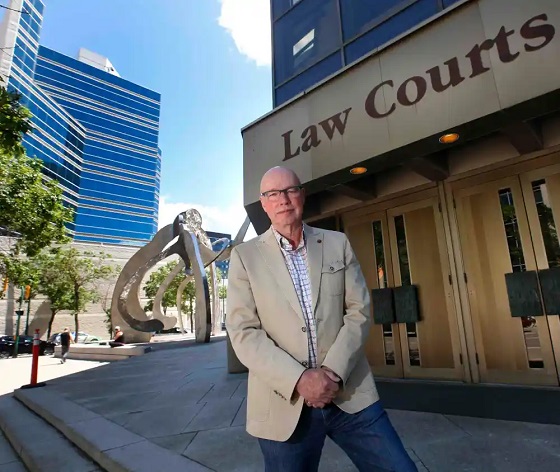
Deputy Minister of Jobs, Economy and Trade Christopher McPherson has issued the following statement on an independent third-party investigation into procurement and contracting processes used by the Government of Alberta and Alberta Health Services (AHS):
Deputy Minister of Jobs, Economy and Trade Christopher McPherson has issued the following statement on an independent third-party investigation into procurement and contracting processes used by the Government of Alberta and Alberta Health Services (AHS):
“While serving as Acting Deputy Minister of Executive Council, Premier Danielle Smith asked me to establish a credible, independent, third-party investigation into the procurement processes used by the Government of Alberta and AHS and their outcomes.
“I have informed Premier Smith that the Honourable Raymond E. Wyant, former Chief Judge of the Provincial Court of Manitoba, will lead this investigation. I asked Premier Smith to issue a ministerial order to facilitate his work and she has done so. Judge Wyant’s work on this matter begins immediately.
“Judge Wyant was appointed to the Manitoba bench in 1998 before becoming Chief Judge in 2002. Prior to his service on the bench, Judge Wyant worked as a criminal defence lawyer and Crown attorney and was acting deputy director of Manitoba prosecutions at the time of his appointment to the Bench. He has also taught law for many years at Robson Hall at the University of Manitoba.
“Judge Wyant will review the relevant legislation, regulations and policies related to procurement typically used by Government of Alberta departments and agencies, specifically AHS, and their application to the procurement of pharmaceuticals and to services offered by chartered surgical facilities. Questions that Judge Wyant will consider are outlined in the attached terms of reference, and include whether or not any elected official, Government of Alberta or AHS employee, or other individuals, acted improperly during the procurement processes. Judge Wyant will make recommendations to the government for improvement or further action as appropriate.
“Appointed under the Government Organization Act, Judge Wyant will operate independently of government. The Government of Alberta will provide Judge Wyant with access to all relevant documents held by its departments and AHS, as well as facilitate interviews with relevant individuals.
“Judge Wyant has been given a budget of $500,000 to undertake this important work, including to retain legal and audit assistance at his discretion. He is being paid $31,900 per month, which is the same remuneration rate as the Chief Justice of the Alberta Court of Justice.
“To ensure additional independence, Service Alberta and Red Tape Reduction will hold the budget for this third-party investigation.
“Judge Wyant will deliver an interim written report by May 30, 2025. A final written report and recommendations will be delivered by June 30, 2025, and it will be posted on alberta.ca.”
Related information
Alberta
Province announces funding for interim cardiac catheterization lab at the Red Deer Regional Hospital
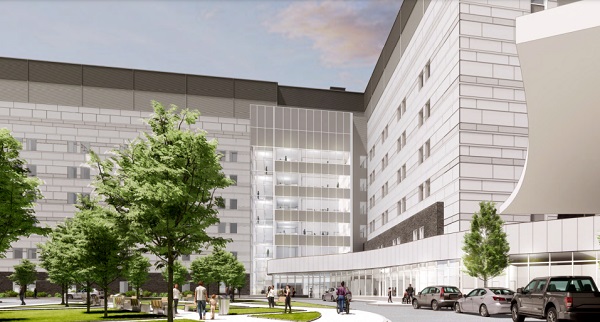
Alberta’s government is partnering with the Red Deer Regional Health Foundation to expedite the delivery of life-saving cardiac services to central Alberta residents.
Alberta’s government is partnering with the Red Deer Regional Health Foundation to expedite the delivery of life-saving cardiac services to central Alberta residents.
Alberta’s government is committed to ensuring that Albertans have access to the health care they need, including life-saving cardiac care and lab services, no matter where they live. For those in central Alberta, the Red Deer Regional Hospital Centre plays a critical role in providing that care, which is why the $1.8-billion Red Deer Regional Hospital Centre redevelopment project includes two state-of-the-art cardiac catheterization labs.
While the project is expected to be completed by 2031, the government recognizes the urgent need for cardiac services for the 450,000 Albertans from Red Deer and surrounding rural communities. If passed, Budget 2025 will provide $3 million in startup funding and ongoing funding to cover the operational costs for an interim cardiac catheterization lab at the Red Deer Regional Hospital Centre.
“Every Albertan should have access to the health care services they need close to home. Albertans living in the Red Deer area have long advocated for a cardiac catheterization lab and I am pleased to support a project that we know will help save lives.”
A cardiac catheterization lab is a dedicated space where specialized teams can carry out diagnostic tests that examine and evaluate heart function to aid in the diagnosis of cardiac health concerns and treatment of coronary artery disease. The lab will be equipped with specialized imaging equipment to allow for cardiac procedures primarily including ablation, angiogram and angioplasty.
The interim cardiac catheterization lab will be located within the existing Red Deer Regional Hospital Centre in a space currently being used as a physician’s lounge. Preliminary design plans are already in place and construction is expected to begin by fall 2025.
The Red Deer Regional Health Foundation has committed to funding the capital cost of the project, which is expected to be about $22 million.
In October 2024, the foundation announced the signing of a memorandum of understanding with Alberta Health Services to fast-track the opening of a cardiac catheterization lab at Red Deer Regional Hospital Centre.
“We are incredibly grateful for the generosity of the Donald and Lacey families, whose support is bringing life-saving cardiac care closer to home for the benefit of all central Albertans. Together with all our health care partners, their commitment to advancing health care will make a lasting impact on countless lives for years to come.”
The foundation’s work is made possible by the generosity of donors, supporters and champions across the region. To support the development of the interim cardiac catheterization lab, the foundation announced a $10-million donation from the John Donald family.
“I am pleased to support the development of cardiac services in central Alberta, something we’ve long advocated for. This initiative will provide essential care to our community and ensure that more lives are saved closer to home.”
By prioritizing the development of an interim cardiac catheterization lab, patients will have access to critical services about three years earlier than expected. The interim cardiac catheterization lab is expected to be operational in early 2027.
“Developing this lab will allow us to treat more cardiac patients closer to home and support them in their recovery. Enhancing our cardiac services will also support our efforts to recruit and retain the talented professionals needed to care for our region’s patients.”
Being able to meet the needs of the province’s rapidly growing population is a top priority for Alberta’s government.
Quick facts
- The $1.8-billion Red Deer Regional Hospital Centre redevelopment project will upgrade several services throughout the hospital site, including:
- an additional patient tower
- six new operating rooms
- a new medical device reprocessing department
- two new cardiac catheterization labs
- renovations to various areas within the main building
- a newly renovated and expanded emergency department
- a new ambulatory clinic building to be located adjacent to the surface parkade
Related information
-
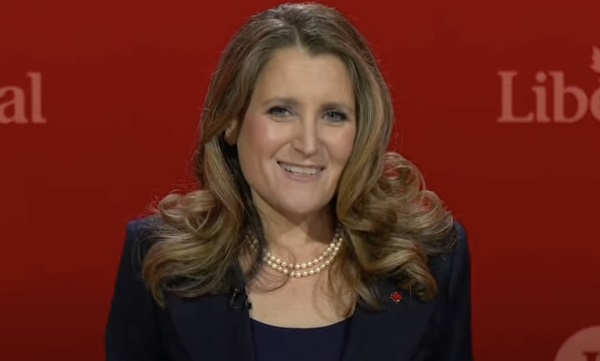
 National2 days ago
National2 days agoWar against the US? Chrystia Freeland says Canada, allies need to build ‘New World Order’ to combat Trump
-

 Opinion2 days ago
Opinion2 days agoLiberal leadership race guarantees Canadian voters will be guided by a clown show for a while yet
-

 Business2 days ago
Business2 days agoTaxpayers launching court fight against CBC transparency
-

 Courageous Discourse1 day ago
Courageous Discourse1 day agoZelensky Met with Dems Before He Met President Trump
-

 Business2 days ago
Business2 days agoElon Musk: ‘I’m getting a lot of death threats’ due to DOGE
-
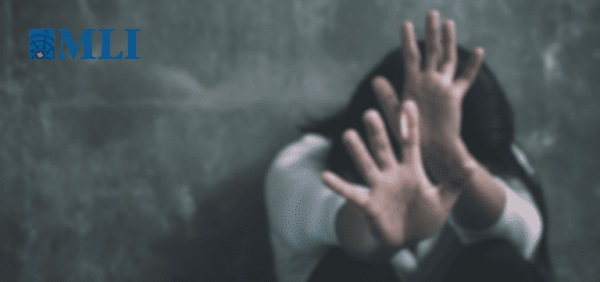
 Crime2 days ago
Crime2 days agoCould the UK’s ‘Grooming Gangs’ operate in Canada?
-

 Alberta2 days ago
Alberta2 days agoCan Trump Revive The Keystone Pipeline?
-
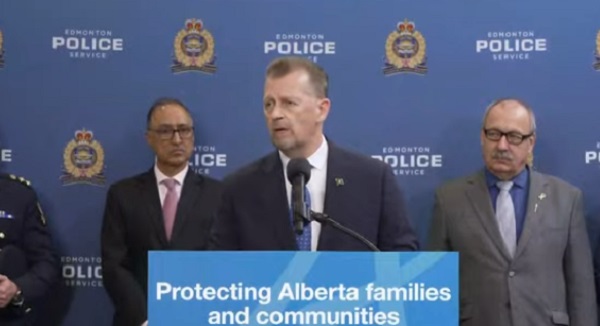
 Alberta2 days ago
Alberta2 days agoAlberta Coordinating law enforcement to fight fentanyl



